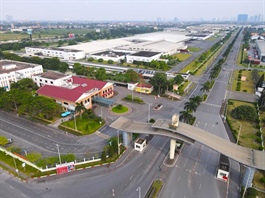Real estate developers propose solutions to avoid obstacles
Real estate developers propose solutions to avoid obstacles
More than 20 leading real estate enterprises have participated and given their recommendations at the Real Estate Credit Conference held by the State Bank of Vietnam on February 8, focusing on current hot issues such as access to capital, interest rates, and legal obstacles.

State Bank of Vietnam (SBV) Deputy Governor Dao Minh Tu said that the purpose of the conference was to listen to proposals to remove the difficulties with credit in the real estate market.
Facing the difficult situation that has lasted since April, representatives of large real estate enterprises such as Vinhomes, Novaland, and Hung Thinh Land have made many recommendations to solve the problems.
Chairman of the Board of Directors at Vinhomes Pham Thieu Hoa raised issues regarding the reasons for borrowing capital, loan interest rates, and collateral ratios.
"In terms of borrowing capital, currently, banks do not finance buying, selling, depositing, or transferring capital contributions and shares in merger and acquisition activities, instead calculating them as loans to buy shares – which are restricted", said Hoa.
Regarding loan interest rates, real estate is subject to a high-risk coefficient of up to 200 per cent compared to normal business activities.
However, Hoa said that fully legal real estate projects are not particularly risky compared to other industries. Therefore, lending interest rates that are higher than for other sectors will affect investors and customers.
In addition, the chairman believes that it is necessary to add specific mechanisms and policies for large-scale investors and projects, while at the same time taking measures to gradually reduce interest rates.
Do Thi Phuong Nam, director of restructuring for the No Va Real Estate Investment Group JSC (Novaland), said that from November 2022, both the financial and real estate markets have been turbulent.
Facing many problems, Novaland cooperated with Ernst & Young to conduct corporate debt restructuring.
"When restructuring debt with international corporations, we persuade them to see it as a systemic risk, so it is necessary to apply temporary emergency measures to avoid defaulting on debts or risking cross-border violations of loans," Nam said.
As for domestic loans, Nam feels that businesses face many hurdles and are continuing to work with banks to remove them. Therefore, right now, Novaland proposes that SBV should consider allowing real estate corporations to restructure debts or delay them for 24-36 months.
Regarding the bond market, Nam from Novaland suggested that the SBV, with credit institutions, financial enterprises, and commercial banks as professional investors, consider solutions that can help businesses fulfill their obligations to bondholders.
Le Trong Khuong, general director of Hung Thinh Land, agreed on the bond issue.
“Like some countries around the world, raising capital from bonds is a perfect source of money for businesses. However, this capital channel is currently in a bottleneck. To solve this difficult situation from the business perspective, I suggest the State Bank and aligned ministries consider a plan to support businesses to survive so that bondholders feel secure with their investments. Specifically, we believe that the State Bank should increase its lending room so that businesses can access the required capital,” Khuong said.
The second issue raised by Hung Thinh Land is that interest rates are at a high level.
“Foreign investors in Vietnam now almost always want to wait and see. High-interest rates also affect the price of new products launched on the market,” he added.
According to the SBV, the real estate credit balance had reached $109.3 billion by the end of 2022, an increase of about 24.3 per cent compared to the end of 2021. This is one of the fields with the highest growth and accounts for 21.2 per cent of total outstanding loans, the highest figure for the past five years.





















